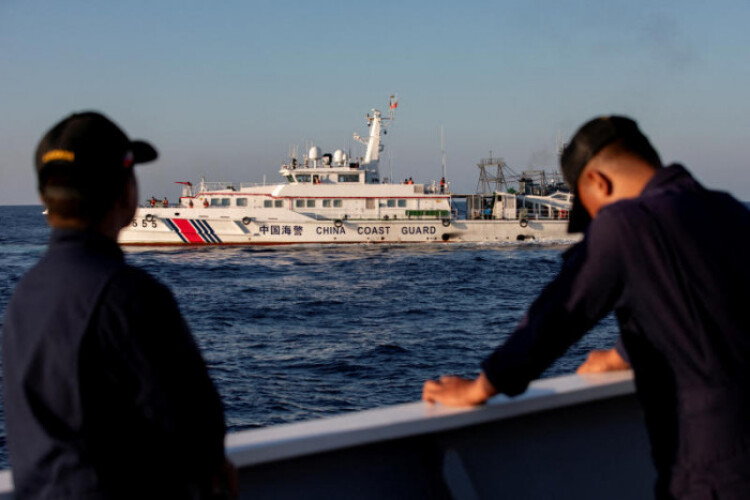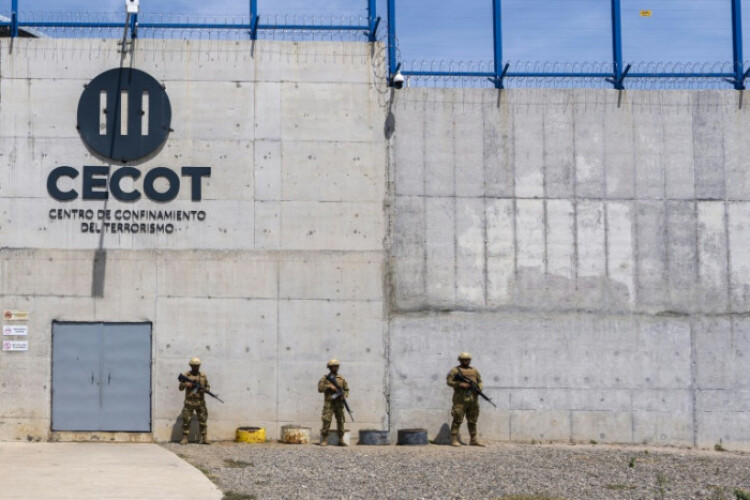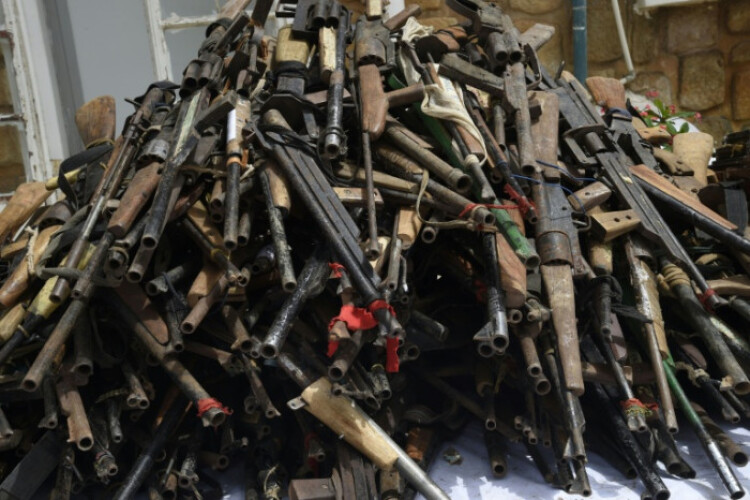
HONG KONG - China has ramped up pressure on the Philippines to withdraw the US Typhon missile system stationed there, warning of "arms race risks" in the region.
Beijing's foreign ministry on Thursday also slammed Manila's plans to acquire its own set of the mid-range missiles, two days after the Philippine defence chief asserted his country's "sovereign prerogative" to boost its security capabilities.
"The Philippines, by cooperating with the United States to introduce the Typhon, is handing over its own security and defence, bringing geopolitical confrontation and arms race risks into the region, which poses a substantial threat to regional peace and security," Chinese foreign ministry spokeswoman Mao Ning said.
"Whose interests are truly being served by such actions? How can one speak of independent diplomacy in this context? This is a typical case of harming both others and oneself."
The comments were the third on the issue this week from Beijing. They followed Philippine Defence Secretary Gilberto Teodoro Jnr's statement on Tuesday justifying the deployment of the US system and the Philippine army's confirmation on Monday of plans to acquire its own Typhon missiles, despite continued strong opposition from China.
The US Army deployed the medium-range missile system in the northern Philippines after bringing them in to take part in joint military drills over April and May.
The Typhon system can be equipped with cruise missiles capable of striking Chinese targets, and its deployment has worsened tensions between China and the Philippines, which have seen a string of confrontations in the South China Sea over disputed territory.
A view of the Typhon missile system at Laoag International Airport, in Laoag, the Philippines, on Sept 18, 2024, in this satellite image. (Photo: supplied)
This is the first time that such a weapon system had been deployed in the Asia-Pacific region since the 1987 intermediate-range nuclear forces treaty between the United States and the erstwhile Soviet Union prohibited the development and possession of land-based missiles with a range of 500 kilometres to 5,500km (about 311 miles to 3,100 miles).
Typhon is a land-based, ground-launched system that improves multi-domain capability. The launcher can fire the Raytheon Standard Missile 6 (SM-6) and the Tomahawk Land Attack Cruise Missile (TLAM), with respective operational ranges of more than 240km and 2,500km, rendering it capable of covering both the South China Sea and the Taiwan Strait.
China has slammed the deployment as a threat to the regional situation and repeatedly urged the Philippines to remove it.
Manila said in early July that the system could be withdrawn as early as September, but a top Philippine security official later said there was no immediate timeline for this.
Teodoro said that the deployment of such weapons in the Philippines, a US treaty ally, was "completely legitimate, legal, and beyond reproach". He said any plans of defence capability enhancement were "on the basis of the Philippines' own national interest and in accordance with our independent foreign policy".
"The Philippines is a sovereign state, not any country's 'doorstep'," Teodoro said.
"Any deployment and procurement of assets related to the Philippines' security and defence fall within its own sovereign prerogative and are not subject to any foreign veto."
The Typhon system was not targeted against specific countries, and instead aimed to target against "security risks, threats, and challenges", Teodoro added.
This came after China on Monday reiterated its firm opposition to its deployment, with spokeswoman Mao calling the system "strategic and offensive".
Her comments were a response to the confirmation earlier in the day by the Philippine army's commanding general, that negotiations were on to acquire the Typhon "because we see its visibility and adaptability".
"It is an extremely irresponsible choice for the history and people of itself and the whole of Southeast Asia, as well as for the security of the region," Mao said.
On Wednesday, the Chinese embassy in Manila said it "firmly opposed and strongly condemned" the "unjust accusations" made by Teodoro, after he said China was criticising the "modest capability development of the Philippines" while "continuously building up" its own nuclear arsenal and ballistic missile capability.
The embassy also accused the defence chief of impeding military-to-military contact and exchanges between the two countries.
Beijing's foreign ministry on Thursday also slammed Manila's plans to acquire its own set of the mid-range missiles, two days after the Philippine defence chief asserted his country's "sovereign prerogative" to boost its security capabilities.
"The Philippines, by cooperating with the United States to introduce the Typhon, is handing over its own security and defence, bringing geopolitical confrontation and arms race risks into the region, which poses a substantial threat to regional peace and security," Chinese foreign ministry spokeswoman Mao Ning said.
"Whose interests are truly being served by such actions? How can one speak of independent diplomacy in this context? This is a typical case of harming both others and oneself."
The comments were the third on the issue this week from Beijing. They followed Philippine Defence Secretary Gilberto Teodoro Jnr's statement on Tuesday justifying the deployment of the US system and the Philippine army's confirmation on Monday of plans to acquire its own Typhon missiles, despite continued strong opposition from China.
The US Army deployed the medium-range missile system in the northern Philippines after bringing them in to take part in joint military drills over April and May.
The Typhon system can be equipped with cruise missiles capable of striking Chinese targets, and its deployment has worsened tensions between China and the Philippines, which have seen a string of confrontations in the South China Sea over disputed territory.
A view of the Typhon missile system at Laoag International Airport, in Laoag, the Philippines, on Sept 18, 2024, in this satellite image. (Photo: supplied)
This is the first time that such a weapon system had been deployed in the Asia-Pacific region since the 1987 intermediate-range nuclear forces treaty between the United States and the erstwhile Soviet Union prohibited the development and possession of land-based missiles with a range of 500 kilometres to 5,500km (about 311 miles to 3,100 miles).
Typhon is a land-based, ground-launched system that improves multi-domain capability. The launcher can fire the Raytheon Standard Missile 6 (SM-6) and the Tomahawk Land Attack Cruise Missile (TLAM), with respective operational ranges of more than 240km and 2,500km, rendering it capable of covering both the South China Sea and the Taiwan Strait.
China has slammed the deployment as a threat to the regional situation and repeatedly urged the Philippines to remove it.
Manila said in early July that the system could be withdrawn as early as September, but a top Philippine security official later said there was no immediate timeline for this.
Teodoro said that the deployment of such weapons in the Philippines, a US treaty ally, was "completely legitimate, legal, and beyond reproach". He said any plans of defence capability enhancement were "on the basis of the Philippines' own national interest and in accordance with our independent foreign policy".
"The Philippines is a sovereign state, not any country's 'doorstep'," Teodoro said.
"Any deployment and procurement of assets related to the Philippines' security and defence fall within its own sovereign prerogative and are not subject to any foreign veto."
The Typhon system was not targeted against specific countries, and instead aimed to target against "security risks, threats, and challenges", Teodoro added.
This came after China on Monday reiterated its firm opposition to its deployment, with spokeswoman Mao calling the system "strategic and offensive".
Her comments were a response to the confirmation earlier in the day by the Philippine army's commanding general, that negotiations were on to acquire the Typhon "because we see its visibility and adaptability".
"It is an extremely irresponsible choice for the history and people of itself and the whole of Southeast Asia, as well as for the security of the region," Mao said.
On Wednesday, the Chinese embassy in Manila said it "firmly opposed and strongly condemned" the "unjust accusations" made by Teodoro, after he said China was criticising the "modest capability development of the Philippines" while "continuously building up" its own nuclear arsenal and ballistic missile capability.
The embassy also accused the defence chief of impeding military-to-military contact and exchanges between the two countries.






